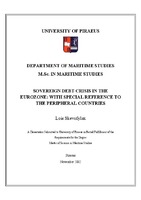Sovereign debt crisis in the eurozone: with special reference to the peripheral countries

Προβολή/
Θεματική επικεφαλίδα
Οικονομικές κρίσεις -- 21ος αιώνας ; Ευρωπαϊκή Ένωση -- Οικονομική πολιτική ; Ευρωπαϊκή Ένωση, Χώρες της -- Οικονομικές συνθήκεςΠερίληψη
The aim of this dissertation was to explore the overreaching theory that sovereign debt crisis plays in the economy of a nation in conjunction with the active role of the Eurozone member states. The study introduces the previous financial crises and concentrates in the current sovereign debt crisis. The following research defines a description of how this crisis is formed and how the European leaders through their policy measures, are reflected in the crisis. One of the main objectives of this study is to identify the highly indebted peripheral countries (Greece, Ireland, Italy, Portugal and Spain) in order to highlight the consequences against sovereign debt dynamics in the Eurozone. A scenario approach, as the explanatory method to illustrate potential events about the future of the Euro area and to consider the implications of the member states was presented. Results indicate that rescue packages along with controlled tough austerity measures failed to provide sufficient confidence to the financial markets, as the problems facing the PIIGS (Portugal, Italy, Ireland, Greece and Spain) remained and were aggravated as GDP growth rates were falling, yields on government bonds rose sharply and unemployment rates were rising. Our empirical findings derived from the research methods conducted, suggest that the survival of the common currency area, and in effect Eurozone, depends not only on macro- economic issues but to a large extent on policy-making.


